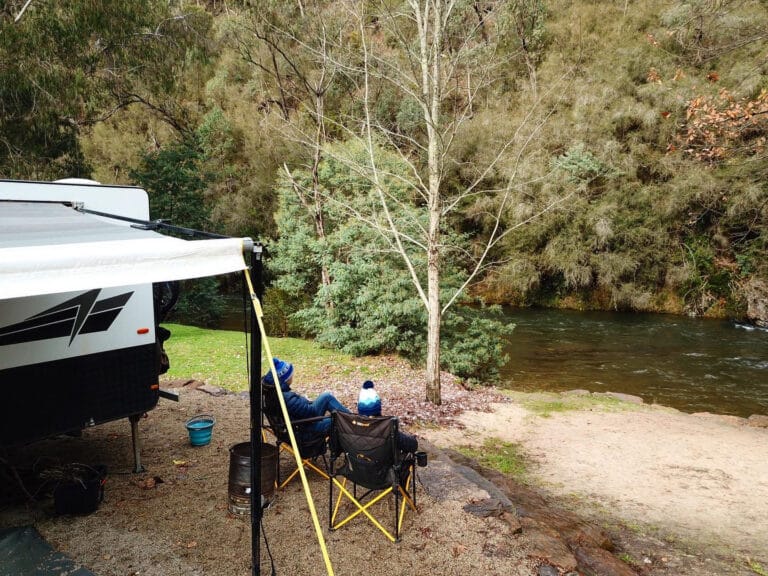GUIDE 2 – RV Daily Practical Guide to Modern Towing: Part 4
Towing School? Really! Why on earth would you want to do that? Surely we can learn on the road can’t we?
The truth of towing nowadays is that most people don’t have the time to effectively learn the necessary towing skills whilst on the road. You want to make the most of your holiday and you want your holiday to be as trouble free as possible.
So in order to get that reassurance of a great holiday, more and more people are turning to a towing course to learn the essential skills prior to departure. For some it is the fact that hubby can tow quite well and the course gives his partner the reassurance to tow should he succumb to illness or injury. For others, they may have just purchased their new van and want to learn the right way from the start. Whatever the reason, it makes good sense to either learn properly from the get-go or participate in a course to break the bad habits that you may have developed over the years. Even if you have been towing correctly for many years, wouldn’t it be great to have that confirmed? It is also a great opportunity to catch up on the latest legislation.
If it is presented correctly, there is so much to learn on a towing course, from reversing through to emergency braking techniques. In truth, a towing course is about 75% marriage counselling, so firstly your instructor should make it easy for you to communicate with each other by ensuring that you are both speaking the same language, that way you both understand what each other is trying to achieve when manoeuvring the trailer. This comes in very handy to prevent all those niggly little arguments that may happen at the end of the day. It also helps to disappoint those onlookers (Eddy the experts) who are already in the caravan park and just waiting for someone to come in late, so they can offer “all their years of experience”.
The course that you choose should offer a comprehensive program, as mentioned previously, it should include reversing in a straight line, reversing at right angles both from the driver and passenger’s side, this should also include a logical set of sequences to ensure that you perform these manoeuvres to a repeatable standard no matter where you do them.
The course should also cover driving forward and teach you how to account for how the trailer takes a shorter path when cornering.
Other subjects that should be in the course, will include hitching and unhitching in a logical safe sequence, learning your brake controller, how to do a safety check of the trailer and vehicle, correct driving position, emergency braking procedures and manoeuvring in a variety of situations. There should also be discussions on the benefits and pitfalls of weight distribution systems, and stability control systems, when they should be used and how they should operate.
Importantly, the course should also include great practical advice on how to set up and operate your brake controller. Knowing the difference between a pendulum unit, or a solid state or an inertia unit is paramount. This is one area that your instructor should be extremely knowledgeable, because this is not a set and forget system, having a correctly adjusted brake controller can mean the difference between stopping efficiently or not stopping at all. We know that even as low as 60km/h with a properly adjusted brake controller a car and caravan combination can take 19 metres to stop not taking into account the amount of time it takes to get your foot onto the brake which is on average around 1.5 seconds, (this equates to 25 metres at 60km/h).
Another very important part of the training program to consider is the consolidation drive. The instructor should allow sufficient time toward the end of the training program to conduct a consolidating road drive. This 15-20 minute exercise gives the instructor the opportunity to talk about vehicle/trailer road positioning, overtaking large vehicles, being overtaken by large vehicles and the most economical speeds at which to travel.
Of the courses that I have looked at currently on the market, quite a few of them come up short with the amount of information that is transferred to the student, they are too rushed to effectively give the student the necessary information and sufficient time to practice their new-found skills.
Making the decision to do a towing course is an important one, you want to get the best value for your money and you want to learn as much as you can so before you choose, here are a few questions you should ask:
A: Are they National, can they provide training in each state? You may live in Queensland, but want to purchase a van in Victoria, a company that trains in each state allows you to conduct the course before you return home with your new acquisition.
B: Are they a Registered Training Organisation (RTO) providing a nationally-recognised towing course, or are they associated with an RTO. The towing course that is provided by a Registered Training Organisation is quality controlled, conducted by qualified instructors who are also regularly audited, ensuring that you will receive the best training possible.
C: How long is the course? When you consider how much there is to learn during a towing course, then a four-hour course in never going to be good enough.
It needs to be at least a full day.
D: What is the instructor to student ratio, ideally it should not be any more than six students to one instructor, less is even better.
E: Is this course recognised by any insurance companies, do I get a rebate or a discount on my insurance because I have done the course. After all, every little bit helps in making your towing cheaper and more reassuring.
There is also quite a bit of online chatter regarding the need for a licence endorsement to allow someone to tow a trailer over a certain size. It is not our intention to enter that discussion, but who knows, one day it may be a requirement.
Having recently trawled through quite a few of the online caravan forums and many of them feature the benefits of different course providers, it seems that everyone has an opinion. It is up to you, however, to determine if a course is right for you, but we believe that the benefits are amazing and very well worth the investment.












